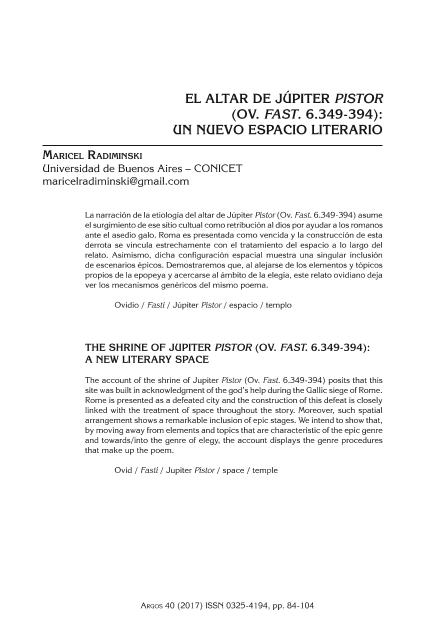Artículo
La narración de la etiología del altar de Júpiter Pistor (Ov. Fast. 6.349-394) asume el surgimiento de ese sitio cultual como retribución al dios por ayudar a los romanos ante el asedio galo. Roma es presentada como vencida y la construcción de esta derrota se vincula estrechamente con el tratamiento del espacio a lo largo del relato. Asimismo, dicha configuración espacial muestra una singular inclusión de escenarios épicos. Demostraremos que, al alejarse de los elementos y tópicos propios de la epopeya y acercarse al ámbito de la elegía, este relato ovidiano deja ver los mecanismos genéricos del mismo poema. The account of the shrine of Jupiter Pistor (Ov. Fast. 6.349-394) posits that this site was built in acknowledgment of the god’s help during the Gallic siege of Rome. Rome is presented as a defeated city and the construction of this defeat is closely linked with the treatment of space throughout the story. Moreover, such spatial arrangement shows a remarkable inclusion of epic stages. We intend to show that, by moving away from elements and topics that are characteristic of the epic genre and towards/into the genre of elegy, the account displays the genre procedures that make up the poem.
El altar de Júpiter Pistor (Ov. Fast. 6.349-394): Un nuevo espacio literario
Título:
The shrine of Jupiter Pistor (ov. Fast. 6.349-394): A new literary space
Fecha de publicación:
09/2017
Editorial:
Asociación Argentina de Estudios Clásicos
Revista:
Argos
ISSN:
0325-4194
e-ISSN:
1853-6379
Idioma:
Español
Tipo de recurso:
Artículo publicado
Clasificación temática:
Resumen
Palabras clave:
OVIDIO
,
FASTI
,
JÚPITER PISTOR
,
ESPACIO
Archivos asociados
Licencia
Identificadores
Colecciones
Articulos(SEDE CENTRAL)
Articulos de SEDE CENTRAL
Articulos de SEDE CENTRAL
Citación
Radiminski, Maricel; El altar de Júpiter Pistor (Ov. Fast. 6.349-394): Un nuevo espacio literario; Asociación Argentina de Estudios Clásicos; Argos; 2; 40; 9-2017; 84-104
Compartir
Altmétricas




